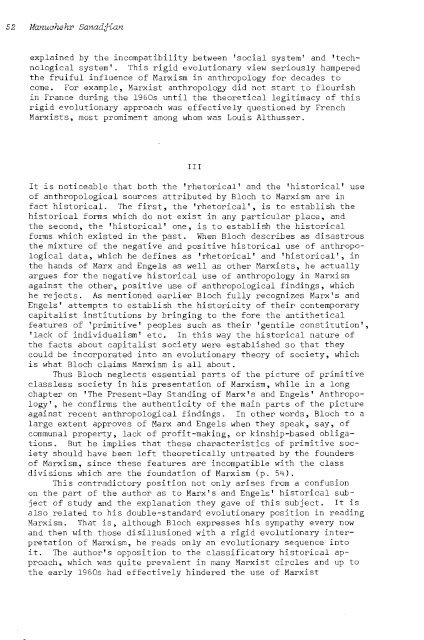CONTENTS NO.I - Institute of Social and Cultural Anthropology ...
CONTENTS NO.I - Institute of Social and Cultural Anthropology ...
CONTENTS NO.I - Institute of Social and Cultural Anthropology ...
You also want an ePaper? Increase the reach of your titles
YUMPU automatically turns print PDFs into web optimized ePapers that Google loves.
52 Manuchehr Sanadjian<br />
explained by the incompatibility between 'social system' <strong>and</strong> 'techsystem'.<br />
This rigid evolutionary view seriously hampered<br />
the fruiful influence <strong>of</strong> Marxism in anthropology for decades to<br />
come. For , Marxist anthropology did not start to flourish<br />
in France during the 1960s until the theoretical legitimacy <strong>of</strong> this<br />
evolutionary approach was<br />
questioned by French<br />
Marxists, most promiment among whom was Louis Althusser.<br />
III<br />
It is noticeable that both the 'rhetorical' <strong>and</strong> the 'historical' use<br />
<strong>of</strong> anthropological sources attributed by Bloch to Marxism are in<br />
fact historical. The first, the 'rhetorical', is to establish the<br />
historical forms which do not exist in any particular , <strong>and</strong><br />
the second, the 'historical' one, is to establish the historical<br />
forms which existed in the past. When Bloch describes as disastrous<br />
the mixture <strong>of</strong> the negative <strong>and</strong> positive historical use <strong>of</strong> anthropodata,<br />
which he defines as 'rhetorical' <strong>and</strong> 'historical', in<br />
the h<strong>and</strong>s <strong>of</strong> Marx <strong>and</strong> Engels as well as other Marxists, he actually<br />
argues for the historical use <strong>of</strong> anthropology in Marxism<br />
the other, positive use <strong>of</strong> anthropological findings, which<br />
he rejects. As mentioned earlier Bloch fully recognizes Marx's <strong>and</strong><br />
, attempts to establish the historicity <strong>of</strong> their contemporary<br />
institutions by bringing to the fore the antithetical<br />
features <strong>of</strong> 'primitive' peoples such as their 'gentile constitution',<br />
'lack <strong>of</strong> individualism' etc. In this way the historical nature <strong>of</strong><br />
the facts about capitalist society were established so that they<br />
could be incorporated into an evolutionary theory <strong>of</strong> society, which<br />
is what Bloch claims Marxism is all about.<br />
Thus Bloch neglects essential parts <strong>of</strong> the picture <strong>of</strong> primitive<br />
classless society in his presentation <strong>of</strong> Marxism, while in a long<br />
chapter on 'The Present-Day St<strong>and</strong>ing <strong>of</strong> Marx's <strong>and</strong> Engels' <strong>Anthropology</strong>',<br />
he confirms the authenticity <strong>of</strong> the main parts <strong>of</strong> the picture<br />
against recent anthropological findings. In other words, Bloch to a<br />
large extent approves <strong>of</strong> Marx <strong>and</strong> when they , say, <strong>of</strong><br />
communal property, lack <strong>of</strong><br />
, or kinship-based<br />
tions. But he that these characteristics <strong>of</strong> primitive society<br />
should have been left theoretically untreated by the founders<br />
<strong>of</strong> Marxism, since these features are incompatible with the class<br />
divisions which are the foundation <strong>of</strong> Marxism (p. 54).<br />
This contradictory position not only arises from a confusion<br />
on the part <strong>of</strong> the author as to Marx's <strong>and</strong> Engels' historical subject<br />
<strong>of</strong> study <strong>and</strong> the explanation they gave <strong>of</strong> this subject. It is<br />
also related to his double-st<strong>and</strong>ard evolutionary position in reading<br />
Marxism. That is, although Bloch expresses his sympathy every now<br />
<strong>and</strong> then with those disillusioned with a rigid evolutionary interpretation<br />
<strong>of</strong> Marxism, he reads only an evolutionary sequence into<br />
it. The author's opposition to the classificatory historical approach,<br />
which was prevalent in many Marxist circles <strong>and</strong> up to<br />
the early 1960s had effectively hindered the use <strong>of</strong> Marxist

















